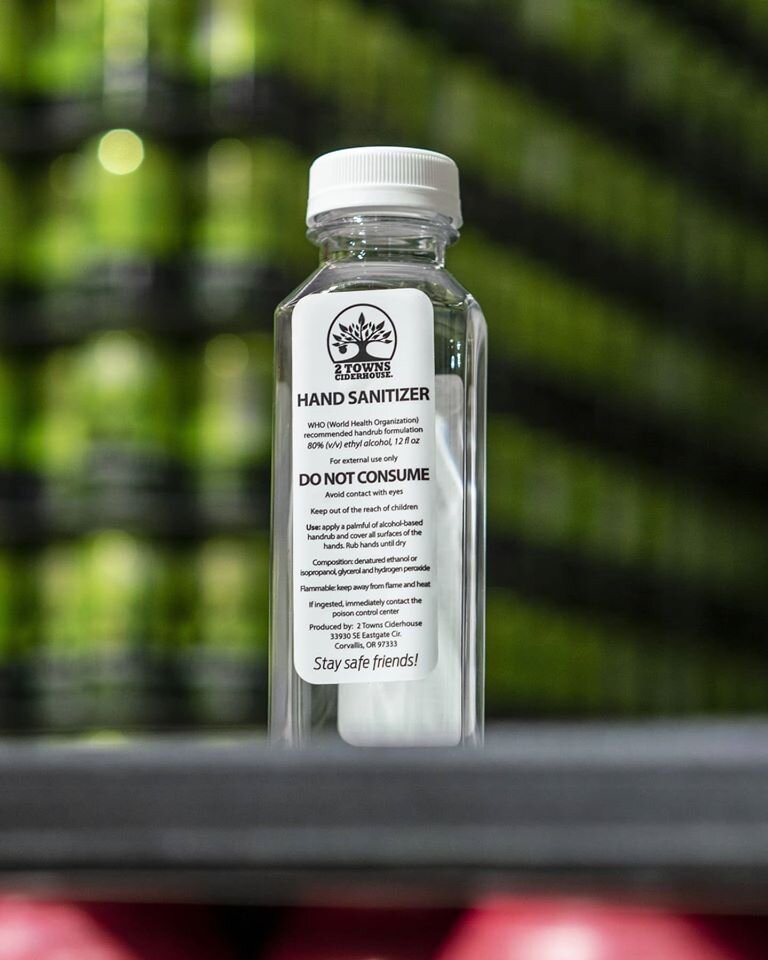Cider Community Rallies To Confront Economic Impact of COVID-19
The cider community is rallying to support it's members during a time of crisis. Like all food and drink hospitality businesses, cideries have been forced to shutdown to the public but are in a slightly different position than the beer industry with an even greater gap between packaged product versus small intimate taproom operations. But in this rare instance, the Coronavirus pandemic may result in a stronger and more adaptable industry if they can get through this crisis.
"This is a brutal time for the cider industry and businesses are suffering greatly, having to lay off staff and shut their doors for the overall safety of our community," says Emily Ritchie, director of the Northwest Cider Association. "I think breweries and cideries are impacted pretty similarly right now. We're all hurting. I don't have projections on closures yet as it is still unclear who will get SBA loans or grants. I think that'll really save a lot of these small craft businesses."
Cideries are suffering just as much as breweries, maybe more. Just as the Brewers Association was forced to cancel the industry Craft Brewers Conference, the NW Cider Association had to cancel their first ever NW Cider Symposium (rescheduled for 3/9/2021). Oregon's largest cider events the Cider Summit in June and the Cider Rite of Spring in April (rescheduled to 11/7/2020) were both canceled. Hard cider was already taking a major hit, taking the brunt of the damage done to craft beverages from the hard seltzer trend dominated by White Claw and Truly.
image from the Portland Cider Summit
In Oregon and Washington, many of the cider brands you know sell the majority of their product off-premise, meaning not in their own establishments. Cideries that don't have major packaging operations for canned product are in big trouble and have resorted to to-go services from tasting rooms and production spaces.
Portland Cider Co. is the only non-brewery cidery in Oregon with multiple taprooms and is doing to-go sales from both. Jeff and Lynda Parrish and one full time staff member are running their Clackamas tasting room and the southeast Hawthorne boulevard Portland Cider House on their own. Even with two well established locations for pick-up, on-premise sales to go are not going well...
"Taproom operations are a drag on our business, there's no amount of curb-side delivery we can do to pay for the labor and overhead, but we're keeping them open as the full time staff it supports are good people who deserve everything we can do to keep them on," says Jeff Parrish, who co-owns Portland Cider Co. with his wife Lynda.
Seattle Cider Company
Seattle Cider Company is one of Washington's largest cidermakers and operates a tasting room called "The Woods" in Seattle's SoDo district. The Woods is offering sales to move products with 25% off kegs, 10% off cases, $2 off growler fills and a $1 off packaged product, even then they have seen a significant decline in sales. Seattle Cider Co. has a robust packaged beer lineup though and has been able to supplement some of the tasting room staff with shifts in the packaging and warehouse departments. They also do deliveries 4-days a week in the Seattle-area and are set up for shipping with VinoShipper.
"Our business was 33% on-premise; 67% off-premise before all COVID-19 precautions," says Seattle Cider Company's sales director Jim Brady. "...but since restaurants and bars either moved to take-out only or closed we have seen a dramatic shift to where the off-premise now represents 79% of our business."
It's fair to say that cider companies prospects in this climate will depend largely on their grocery store placements and reliance on on-premise versus off-premise sales. These smaller cideries have transitioned to doing home delivery such as Reverend Nat's and Bauman's Cider have done. Even smaller operations like Alter Ego cider in southeast Portland are doing gift packages with snacks like their picnic baskets.
"Access to bar and restaurant buyers represents a lower barriers to entry than large chain grocery stores where corporate buyers may be located in other states and are generally more difficult to meet with," says 2 Towns Ciderhouse co-founder and director of sales Aaron Sarnoff-Wood. "We have been somewhat lucky in that our business is more heavily weighted to grocery sales so the closures of all on-premise accounts has not had as large of an impact to our business as a total percentage of sales as it could have."
Even with prominent placements and end caps at grocery stores like Fred Meyer's and Whole Foods, 2 Towns Ciderhouse is struggling with the change to their business.
"Our standard ordering structure of a 21 day lead from order to delivery has also been modified as many wholesalers are not comfortable making purchases that far into the future with the unknown risk of further restrictions on consumers," says Sarnoff-Wood.
Having major wholesale distribution partners that assure those grocery store placements has it's own drawbacks. Distributors are working to mitigate their own risks by reducing their purchases for in stock product supply from 30 days inventory to 10. This means the wholesaler has less financial risk of holding product they cannot sell (such as kegs/draft) but adds an effective 20 day interruption to the producers cash flow.
2 Towns is expecting massive reductions in revenue for atleast the first two quarters of 2020. As the forced shutdown was announced, 2 Towns initially informed some staff members that they would be laid off but with a PPP loan and quick restructuring, all staff were able to rejoin the team after taking a week of vacation, sick time or leave. Like other companies, 2 Towns quickly pivoted to keep their employees onboard and redeployed some into different aspects of the business.
"We are doing everything we can to avoid letting people go, and we have offered extended health insurance benefits for those who do choose to depart," says Sarnoff-Wood. Part of the effort to keep the lights on has been partnering with local Corvallis restaurant Brass Monkey for Direct-to-Consumer (DTC) platform that performs delivery from Salem to Portland. The next step is producing hand sanitizer for those in need as well as the 2 Towns team, as of now they have submitted federal and state license applications and await approval.
Portland Cider Co. co-founder Lynda Parrish at their Clackamas taproom
"Our off-premise sales continue to trend upward," says Portland Cider Co. co-owner Jeff Parrish. "Don't know what the category as a whole is seeing but our off-premise package sales are up over last year by mid double digits."
But Parrish says their sales were already on the incline before the pandemic hit and they were expecting a strong spring and summer. So it's difficult to say if a slight uptick in grocery store sales will have any real, or lasting, impact on sales after coronavirus. Due in large part to the performance of products like their Pineapple Rosé, Peach Berry, and seasonal hits like Blueberry Bourbon Basil, the company plans to stay afloat through the pandemic.
Initiatives like their Fruit Forward Community Cider raising money for Hunger Free Oregon have cultured a strong support base and loyal following for Portland Cider Co. Advancing those programs in both business and non-profit sectors have lead to new revenue streams like their upcoming Portland Cider Club (PCC.)
Portland Cider Club
PCC capitalizes on the growing popularity of beer subscription clubs and adds home delivery, a good fit for the current state of the industry during Coronavirus. Members of the PCC will sign-up for a month rolling subscription that includes 6 different 19.2oz cans, personalized member koozie, early releases and exclusive ciders and a growler fill punch card.
While the cider industry has grown greatly over the past five years, it's been dominated by large players like Angry Orchard and Woodchuck. Small craft cideries have largely been content to lie in the shadows with branding, marketing and outreach being afterthoughts. That has changed with the maturing of the industry and major competition from the likes of macro hard seltzer brands. With some optimism, the latest crisis for the craft cider industry will unfortunately prove the undoing of some but hopefully a strengthening of others.
"To say we are seeing an "increase" in off vs on..." muses Seattle Cider Company's Jim Brady noting that it's a mitigating factor to a decrease in business. "I am more comfortable saying that our off-premise business is trending significantly better than our on-premise business."
"From what I am hearing, cideries have lost between 60-80% of their business, even the ones that have some grocery placement," says Emily Ritchie of Northwest Cider. "Cider fans are doing their part and buying cider online, joining cider clubs, buying from local bottles shops, and getting cider delivered to their doors."
The regional non-profit trade organization Northwest Cider has redoubled efforts to reach cidermakers and fans alike. The interactive map of pacific northwest cidermakers at NWCider.com now includes a filter so fans can find what cideries are shipping or delivering to their doorstep. Capitalizing on the growing list of northwest cideries now shipping or doing home delivery, the trade group is now hosting weekly virtual tours and tastings with cidermakers every Thursday at 4pm.
"The cider industry is well known for banding together and taking care of each other, so I’ve seen a lot of cideries offering advice to each other, sharing best practices and just overall providing support across the industry," says Seattle Cider's Jim Brady. "Additionally, the American Cider Association and NW Cider Associations have jumped to action to help gather resources for cideries to try to stay afloat in uncertain times."
American Cider Association
On April 22nd the American Cider Association joined the Brewers Association, the Distilled Spirits Council, the Wine Institute and other trade groups in a call to action for congress to take steps for economic relief. They are requesting the government stop the federal excise tax increases, suspend tax operations and tariffs, and approve additional funding for no and low interest loans and grants. Urge Congress to Approve Economic Relief from COVID-19 for Craft Beverage Alcohol Producers.
If you are a producer struggling with how to handle the situation, the Cider Association has a page of COVID-19 resources for cideries.










